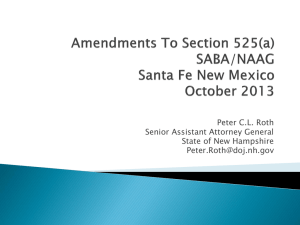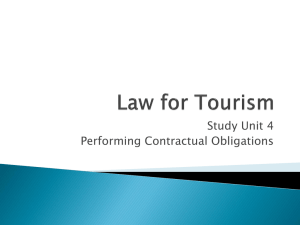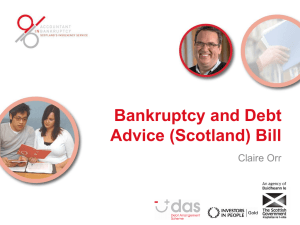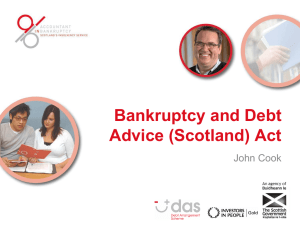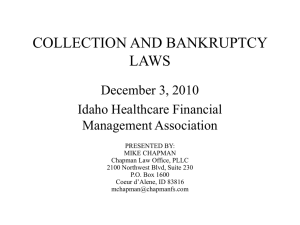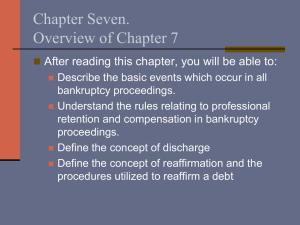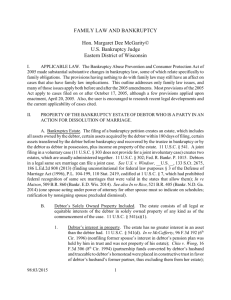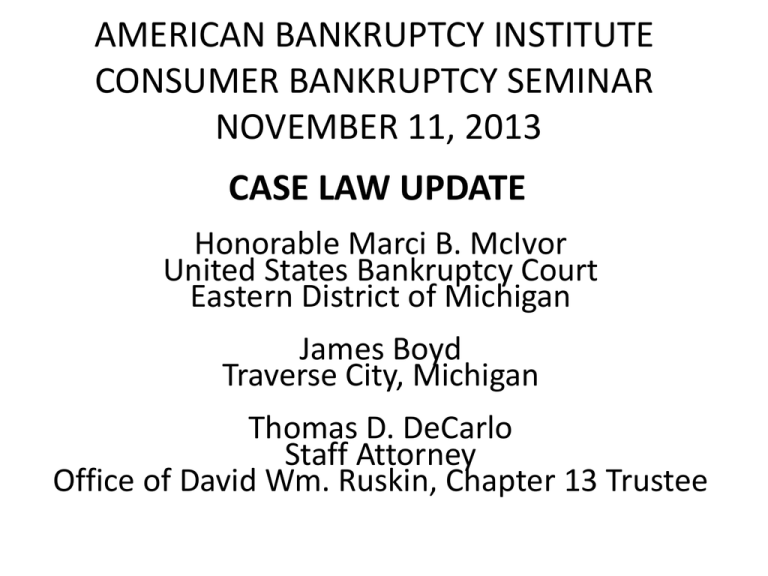
AMERICAN BANKRUPTCY INSTITUTE
CONSUMER BANKRUPTCY SEMINAR
NOVEMBER 11, 2013
CASE LAW UPDATE
Honorable Marci B. McIvor
United States Bankruptcy Court
Eastern District of Michigan
James Boyd
Traverse City, Michigan
Thomas D. DeCarlo
Staff Attorney
Office of David Wm. Ruskin, Chapter 13 Trustee
THE NEW FORMS ARE COMING!
THE NEW FORMS ARE COMING!!
Effective December 1, 2013, there are a few new
forms that take effect. These include the new
form schedules I and J, which take the current
one page form and transform them into multiple
page forms.
The new forms can be found at
http://www.uscourts.gov/FormsAndFees/Forms/
BankruptcyForms/BankruptcyFormsPendingChan
ges.aspx
Or Google “Amended Bankruptcy Forms”
Recent Supreme Court Cases
Bullock v. BankChampaign, 133 S. Ct. 1754
(2013) – Intent or scienter require to prove
defalcation under Section 523(a)(4).
U.S. v. Windsor, ______ US _________, 133 S.Ct.
2675, 2013 WL 3196928 (2013) – Federal
Defense of Marriage Act is unconstitutional.
Federal Government cannot deny benefits to
same sex couples where couple is lawfully
married as a matter of state law where the
ceremony was performed.
Upcoming Supreme Court Cases
In re Bellingham Insurance Agency, Inc., 702 F.3d
553 (9th Cir. 2012), cert granted, ___ U.S. ___
(2013) – Can parties waive objection to subject
matter jurisdiction after Stern?
In re City of Detroit, 2013 WL 5425104 (Bankr.
E.D. Mi. 2013) – authority of bankruptcy court to
enter final judgment after Stern.
Law v. Siegel, 435 Fed. Appx. 67 (9th Cir.
2011), cert granted, ___ S. Ct. ___ (2013) –
Can Chapter 7 Trustee surcharge debtor’s
exemptions to cover administrative costs?
Property of the Estate
Leitch v. Christians, 494 BR 918 (8th Cir. BAP
2013) – Debtor’s interest in Health Savings
Account is property of the estate.
Post Petition Property
In re Hargis, 2013 WL 4514090 (Bankr. N.D. Ohio
2013) – Property that debtor acquires postpetition such as life insurance proceeds and
proceeds of inherited 401-k are property of
estate that do not revest and remain property of
estate.
Axis Surplus Insurance Company v. Flugence, 732
F.3d 428 (5th Cir. 2013) – Chapter 13 debtor has
continuing duty to disclose causes of action that
arise post-petition and post-confirmation.
Post Petition Equity
In re Hodges, 2013 WL 1755483 (Bankr. E.D. Tn.
2013) – Equity that accrues in converted case
between commencement of Chapter 13 and
conversion to Chapter 7 is not property of the
estate.
Abandonment
Cook v. Wells Fargo Bank, NA, 2013 WL 1297590
(10th Cir. 2013) – Failure to follow procedural
requirements of Section 554 and Rule 6007
renders abandonment ineffective.
Authority of Chapter 7 Trustee
In re Przybysz, Case No. 10-7110 (Bankr. W.D. Mi.
2013) – Chapter 7 Trustee of individual debtor’s
estate has authority to cause wholly owned
subsidiaries to file independent bankruptcy
cases.
In re Breece, 2013 WL 197399 (6th Cir. BAP 2013)
– Debtor’s status as sole member of LLC does not
convey to debtor an ownership interest in the
assets of the LLC.
Windham v. East Ohio Gas, 2013 WL 5216429
(N.D. Ohio 2013) – Only Trustee has standing to
pursue pre-petition causes of action.
Tyler v. DH Capital Management, Inc., 2013 WL
5942072 (6th Cir. 2013) – All pre-petition causes of
action become property of estate upon filing, and
only the trustee has standing to pursue actions
post-petition.
Judicial Estoppel
Mowder v. Permanent General Assurance Corp. of
Ohio, 2013 WL 5923766 (N.D. Ohio 2013) – Chapter
7 Trustee not precluded from pursuing undisclosed
asset even if debtor might receive a portion of any
award.
In re Rotunda, 2013 WL 486968 (Bankr. D.C. 2013) –
Chapter 7 Trustee is not judicially estopped from
pursuing unscheduled and undisclosed cause of
action but debtor cannot receive any recovery from
undisclosed action.
Mortgage Modification
In re Brinkley, 2013 WL 5935157 (Bankr. E.D. Mi.
2013) – Prohibition on modification of mortgages
on debtor's principal residence applies to the
residence where debtor lived on the petition date.
Further, debtor’s plan lacked good faith where plan
proposed to retain rental property in Florida where
rental income is less than monthly expenses.
In re Rogers, 2013 WL 5804003 (Bankr. W.D. Mi.
2013) – Attorney fees cannot be paid ahead of
ongoing monthly mortgage payment without
constituting improper modification of mortgage.
Attorney Ethics
In re Ortiz, 2013 WL 447890 (Bankr. S.D.N.Y. 2013) –
Retainer agreement that purported to limit
counsel’s obligations to attend only one 341
meeting, even if not concluded, and limited postpetition services, violated ethical obligations.
In re Slabbinick, 2012 WL 5386677 (Bankr. E.D. Mi.
2012) – Unbundling services into pre- and postpetition services does not per se violate Michigan
ethical limitations.
Attorney Fees
Carroll v. Goldstein, Bershad & Fried, 2013 WL
1120019 (E.D. Mi. 2013) – Counsel can receive
additional attorney fees for time expended in
defending prior fee application.
Automatic Stay
Dunn v. Advantage Windows, Inc., 2013 WL
1091737 (Bankr. E.D. Tn. 2013) – Section 362(b)(1)
excludes from the automatic stay enforcement of
criminal statutes without regard to alleged
motivation of creditor in filing criminal complaint.
In re Vega, 2013 WL 3158516 (Bankr. E.D. Mi. 2013)
– Creditor holding property pursuant to possessory
security interest does not violate stay by retaining
property post-petition.
In re Stewart, 2013 WL 5592899 (Bankr. E.D. Mi.
2013) – Creditor’s retention of property of estate
and refusal to return property on demand of debtor
violated stay.
Lien Strips
In re Brisco, 486 BR 422 (Bankr. N.D. Ill. 2013) –
Filing of proof of claim by creditor is prerequisite to
determination of secured status. Where creditor
does not file claim, creditor does not have “allowed
claim” and lien cannot be stripped.
In re Almeida, 2013 BR 1163777 (Bankr. M.D. Fl.
2013) – Condominium Association lien is not
within sphere of protection from valuation under
Section 506. Debtor in Chapter 7 can strip wholly
unsecured condo lien from the property using
Section 506.
Abandonment
In re Rosa, 2013 WL 3380166 (Bankr. D. Hawaii
2013) – Chapter 13 plan that provided that
confirmation order shall constitute a deed of
conveyance of the property when recorded
conveyed title to secured creditor who did not
object to plan term.
Exemptions
Eleiwa v. Whitmore, 2013 WL 2443086 (9th Cir.
BAP 2013) – Debtor could not claim exemption in
home owned by Trust.
In re Nickeas, 2013 WL 4017940 (Bankr. W.D. Wis.
2013) – Liquor license is not “tool of the trade
even if essential to operation of business.
Maestas v. Old World Construction, Inc., 497 BR
167 (10th Cir. BAP 2013) – Debtor cannot claim real
property as “tool of the trade”.
In re Stanley, 2013 WL 2154787 (Bankr. E.D. Mi.
2013) – Benefits paid by State Workers
Compensation Fund constitute payments by
“insurance company” and are exempt under
Section 600.5451 after receipt. Exemption is not
limited to entitlement to future benefits, as long as
funds remain in cash form.
In re Daley, 2013 WL 2922651 (6th Cir. 2013) –
Debtor did not engage in prohibited transaction in
IRA by signing account agreement that granted to
broker a security interest in the account for any
indebtedness that debtor incurred with broker.
In re Clark, 2013 WL 1729600 (7th Cir. 2013) - Nonspousal inherited IRA is not exempt.
Means Test
In re Gandy, 2013 WL 3712425 (Bankr. E.D. Tn.
2013) – Creditors are not authorized to go behind
the figures listed in the Chapter 7 Statement of
Current Monthly Income (Means Test Calculation)
for the purposes of filing a §707(b) motion.
Disposable Income
In re Hicks, Case no. 12-64774 (Bankr. E.D. Mi.
2013) – Debtor’s non-filing spouse not required
to commit spouse’s income for funding of
debtor’s plan where claims being administered in
Chapter 13 consist of debts that debtor accrued
prior to commencement of the case and spouse
was contributing substantial portion of income to
the plan.
U.S. Trustee v. Holmes, 2013 WL 4446947 (Bankr.
M.D. Pa. 2013) – Debtor could exclude money of
debtor’s same sex partner in calculating current
monthly income. Debtor not required to include
income of partner not used for payment of joint
debts.
Liquidation Analysis
In re Engle, 2013 WL 4038625 (Bankr. S.D. Ohio
2013) – Debtor’s plan does not satisfy liquidation
analysis where plan would impose on Chapter 13
Trustee the obligation to pursue preference
recovery. Debtors must either includes anticipated
net value of the preference recovery in liquidation
calculation or prosecute the recovery action.
Avoidable Transfers
Suhar v. Bruno, 2013 WL 5734120 (6th Cir.
2013) – Assumption of third party debt by
debtor who does not receive value as part of
transaction is not for reasonably equivalent
value.
Gold v. JPMorgan Chase Bank, NA, 2013 WL
3270346 (Bankr. E.D. Mi. 2013) –Any
instrument received and recorded by a
register of deeds is conclusively presumed to
comply with recording requirements.
McClarty v. University Liggett School, 2013 WL
4786861 (Bankr. E.D. Mi. 2013) – Pre-petition
payments for debtor’s minor children to attend
private school is not constructively fraudulent.
Sikirica v. Wettach, 2013 WL 1289149 (Bankr.
W.D. Pa. 2013) – Deposit of paychecks into joint
account with spouse is fraudulent transfer to
extent funds were not used to pay household or
personal expenses of debtor.
Suhar v. Agree Auto Services, Inc., 2013 WL
3993867 (Bankr. N.D. Ohio 2013) – Payment of
deficiency on prior car avoidable preference.
Student Loans
Tresedder v. National Collegiate Student Loan
Trust 2005-2, Case No. 12-99011 (W.D. Mi.
2013) – Private student loans are funded by a
non-profit institution where lender intended
loans to pay educational expenses and loans
were guaranteed by non-profit.
Educational Credit Management Corporation v.
Alfes, 709 F.3d 631 (6th Cir. 2013) – Guarantor of
debtor’s obligation holds independent claim
against debtor. Default judgment against lender
in action to determine dischargeability of student
loans does not bind non-party guarantor.
Hahn v. Educational Credit Management
Corporation, 711 F.3d 235 (1st Cir. 2013) – Order
disallowing student loan claim on basis that
debtor had paid non-dischargeable student loans
prior to commencement of bankruptcy precluded
post-discharge efforts to collect alleged balances
owed.
Tax Issues
In re Martin, 2013 WL 4094413 (Bankr. S.D.N.Y.
2013) – Debtor can redeem property from prepetition tax foreclosure sale over life of chapter 13
plan in Chapter 13 filed after the sale occurred but
before redemption expired.
U.S. v. Monahan, 497 BR 642 (1st Cir. BAP 2013) –
Chapter 13 Plan that provided for payment of IRS
priority non-dischargeable claim but did not
propose to pay interest did not discharge interest
portion of tax debt.
Moffitt v. Massachusetts Dept. of Revenue, 2013
WL 5441984 (Bankr. W.D. Ky. 2013) – Debtor’s
failure to timely file returns for years 2003, 2004 or
2005 until August, 2008, did not satisfy obligation
to file tax returns, rendering debts nondischargeable.
Moffitt v. U.S., 2013 WL 3294898 (Bankr. W.D. Ky.
2013) – Section 523(a)(1)(B)(i) makes a tax debt
non-dischargeable if a return is not filed. Tax return
not filed prior to due date was not a “return” for
purposes of Section 523(a)(1).
Lien Avoidance
In re Pees, 2013 WL 3808153 (Bankr. N.D. Ohio
2013) – Debtor can avoid judicial lien were value of
property is less than value of unavoidable liens plus
exemptions. Debtor permitted to avoid entire lien
after claiming asset exempt to extent of $1.00
using wild card exemption.
Discrimination
In re Mead, 2013 WL 64758 (Bankr. E.D.N.C. 2013) –
IRS discriminated against debtor when IRS refused
to abide by pre-petition Offer in Compromise
Ellis v. Dep’t of Homeland Security, 2013 WL
3480259 (Bankr. D. Colo. 2013) – Department of
Homeland Security did not violate Section 525 by
denying renewal of security clearance based on
“bad debt” criteria.
Social Security
Drummond v. Welsh, 711 F.3d 1120 (9th Cir. 2013) –
Chapter 13 debtor’s calculation of repayment plan
that excludes social security income is not lack of
good faith.
In re Holls, Case no. 13-46765 (Bankr. E.D. Mi.
2013) – Debtor’s failure to include SSI in
calculating the plan payment was a lack of good
faith.
In re Wise, Case no. 13-44673 (Bankr. E.D. Mi.
2013) – Debtor’s failure to commit social security
for funding of plan constituted lack of good faith.
Disposable Income
In re Maura, 2013 WL 1730040 (Bankr. E.D. Mi.
2013) – Debtors cannot deduct on means test
payments on retirement loans or voluntary
contributions to retirement accounts.
In re Rogers, Case No. 12-32558 (Bankr. E.D. Mi.
2012) – Debtors cannot exclude post-petition
voluntary retirement contributions in calculating
disposable income.
In re Hargis, 2013 WL 4514090 (Bankr. N.D. Ohio
2013) – Section 1325(b) requirement for payment
of disposable income is not applicable to a postconfirmation plan modification.
Chapter 13 Plan Term
In re McGehan, 2013 WL 4069524 (Bankr. D. Colo.
2013) – Debtor who proposes 100% dividend
cannot be compelled to pay larger payment and to
shorten plan term.
Custodians
In re Ohakpo, 2013 WL 794347 (Bankr. E.D. Mi.
2013) – Custodian retains secured claim in
bankruptcy to extent of equity in property, but
custodian is not entitle to administrative claim as
the seizure of the property does not provide any
benefit to the estate and the custodian has not
been hired by the Chapter 7 Trustee. Custodian is
not entitled to percentage fee as property was
neither sold by custodian nor released because
debtor paid the underlying judgment.
Dismissal
In re Cyncynatus, 2013 WL 3864310 (Bankr. N.D.
Ohio 2013) – Section 1307(b) does not afford
debtor an absolute right to dismiss where debtors
acted in bad faith in the bankruptcy case.
In re Hennessy, 2013 WL 3939886 (Bankr. N.D.N.C.
2013) – When a debtor dies while in confirmed
chapter 13 plan, Rule 1016 allows for case to
either be dismissed or to continue as if debtor was
still alive but does not provide for hardship
discharge based on death of debtor.
Binding Effect of Plan
In re Bolden, 2013 WL 3897048 (E.D. Mi. 2013) –
Creditor holding lien on debtor’s vehicle bound by
terms of confirmed plan that modified contract to
reduce interest rate and reduce principal.
Creditor required to release lien where creditor
had been paid stated principal plus interest, even
if total paid was not sufficient to pay lien under
applicable non-bankruptcy law.
Funds on Hand at Dismissal or Conversion
In re Tejchma, Case No. 09-9138 (Bankr. W.D. Mi.
2013) – In Chapter 12 case, court held that under
Section 349(b), Court has discretion to order that
funds on hand at dismissal be disbursed to
confirmed plan. Disbursement to creditors was
consistent with the plan, on which creditors relied
to their detriment, and disbursement to creditors
would be in the best interests of creditors.
In re Hamilton, 2013 WL 2151457 (Bankr. M.D. Tn.
2013) – Funds on hand with Trustee at dismissal of
case after confirmation of Plan must be used to
pay any outstanding administrative costs including
any previously awarded attorney fees, and any
remaining balance must be returned to the debtor.
In re James, 2013 WL 1700933 (Bankr. N.D. Ill.
2013) – Funds on hand at pre-confirmation
dismissal are to be paid first to unpaid
administrative expenses including attorney fees,
with balance of funds returned to debtor.
Discharge and Secured Claims
Canning v. Beneficial Maine, Inc., 462 BR 258 (1st
Cir. BAP 2011) , aff’d 706 F.3d 64 (1st Cir 2013) –
Creditor does not violate stay or discharge
injunction by refusing to release lien or foreclose
against property. Creditor not required to accept
possession of collateral unless refusal to accept
collateral is subterfuge to coerce payment by the
debtor of the discharged debt.
In re Rogers, 2013 WL 3422702 (Bankr. E.D.N.C.
2013) – Discharge under chapter 13 discharged
debtor’s liability for deficiency resulting from postdischarge default and foreclosure. Deficiency
judgment is not excluded from the scope of the
discharge.
Section 109
Rivera v. Matos, Case No. 12-087 (9th Cir. BAP 2013)
– Court dismissed second filing where debtor
voluntarily dismissed first case after mortgage
company filed for relief from stay.
Bar Orders
Papas v. Buchwald Capital Advisors, LLC, 728 F.3d
567 (6th Cir. 2013) – Court has authority under
Section 105 to release a non-debtor from liability
as a condition of a settlement.
Foreclosure Issues
Mentag v. GMAC Mortgage, LLC, 2013 WL 489181
(E.D. Mi. 2013) – Debtor lacks standing to contest
validity of alleged assignment of mortgage or to
raise alleged defect in assignment in response to
request for relief from stay.
Mullins v. FNMA, 2013 WL 5707798 (E.D. Mi. 2013)
– Legal title to foreclosed property vests in the
purchaser if the property is not redeemed within
allowable time.
Sanctions
Goldberg v. Goodman, Case No. 12-1643 (9th Cir. BAP
2013) – Bankruptcy court acted within discretion in
sanctioning debtor’s counsel including 6 month
suspension from filing new bankruptcy cases, and
referrals to the United States Attorney, Nevada Secretary
of State, Nevada Attorney General, Nevada State Bar and
United States Trustee. Court also imposed monetary
sanctions for attorney fees incurred by debtor’s new
counsel in connection with sanctions process.
Sale Free and Clear
In re Scott, 2013 WL 4498987 (Bankr. E.D. Ky. 2013)
– Section 363(f) allows sale free and clear of liens
if the creditor consents; if the price to be received
is more than the aggregate value of liens on the
property; the lien is in bona fide dispute; or the
creditor could be compelled to accept money
satisfaction of interest. There is no legal basis on
which a debtor could force the lienholder to
accept less than full payment.
Section 523
Pazdzierz v. First American Title Insurance
Company, 2013 WL 2460415 (6th Cir. 2013) – Title
Insurance company, as assignee of original lender
has standing to bring action against debtor to have
debt excepted from discharge based on fraud.
Although fraud claims are generally not assignable,
where promissory note can be assigned, assignee
can bring fraud complaint incidental to execution
of assigned note.
Objections to Claims
In re Rodgers, 2013 WL 2404000 (Bankr. E.D. Tn.
2013) – Failure to attach documents required by
Rule 3001(c), standing alone, is not basis to
disallow claim.
Debtor must allege factual
dispute about who is the holder of the claim; that
Debtors owe someone else or they do not owe
the obligation at all.
In re Reed, 2013 WL 2015984 (Bankr. E.D. Tn. 2013)
– Creditor’s issuance of Form 1099-C “cancellation
of debt” does not alone extinguish the underlying
debt. However, where Form 1099-C has resulted in
debtor’s inclusion of amount stated in Gross
Income on which Debtor then was required to pay
taxes, the combination of the Form 1099-C and
equity requires conclusion that creditor did
discharge debt.
First Place Bank v. Casino Concepts by Design,
Inc., 2013 WL 3351572 (Mi. App. 2013) –
Unscheduled debt is not discharged regardless
of whether case is asset or no asset. There is
no exception in Section 523(a)(3) based on
whether the bankruptcy case as an asset or a
no-asset case. Debtor bears burden for reopening bankruptcy case to add creditor if
debtor wants debt to be declared discharged.
Right to Discharge
In re Voshell, Case No. 13-0454 (Bankr. W.D. Mi.
2013) – Section 1328(f) precludes entry of a
discharge in Chapter 13 if the debtor received a
discharge in a case filed under chapter 7 during
the preceding 4 years. Debtor cannot waive prior
discharge, and there is no basis for a debtor to
revoke his own discharge.

